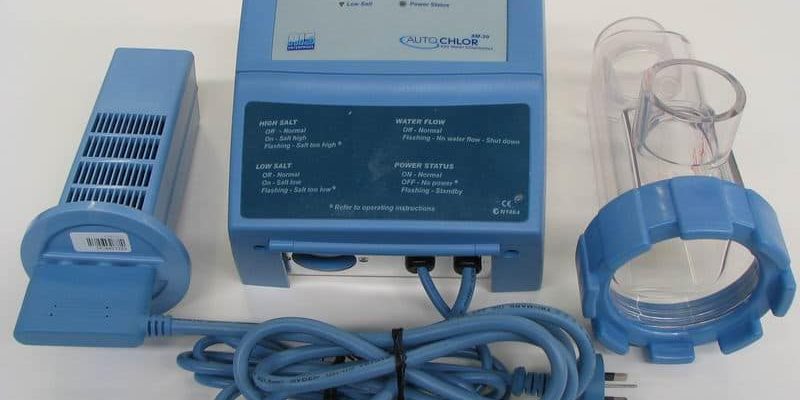Five Reasons to Buy a Salt Water Chlorinator
Over recent years Salt Water Chlorination (SWC) has gained favor as a safe, reliable and economic method of disinfection. It is well suited to the treatment of swimming pools. While the initial cost may be a consideration, the lower operating cost and high level of safety means SWC is appropriate in many instances.
Saltwater chlorination is a process of sanitizing water, using chlorine that is produced in the pool water from ordinary salt. Developed in Australia over 30 years ago, the technology is utilized in over 90% of all residential pools in Australia today. The process occurs via electrolysis, using ordinary salt and a device called a saltwater chlorinator. Initially, a certain amount of salt is added to the water. As water passes over the chlorinator’s specially coated plates, an electric current breaks down the salt and water into their basic elements to form sodium hypochlorite, which is the active sanitizer in all forms of chlorine. The chlorine kills algae and bacteria in the water and oxidizes the waste. Thereafter, the chlorine regenerates itself back to salt and begins the process over again in a virtually unending cycle. Since salt does not evaporate, an occasional addition of salt is needed only to replace what is lost due to the splash out, pumping out, draining or backwashing.
Reason 1 – Economical
The obvious advantage is the cost effectiveness of the salt-water chlorination system. Imagine saving all the money you currently spend on Chlorine. The systems often pay for themselves in a year or so.
Aside from the initial start-up, salt is only added to replace what is lost due to splash out, backwashing, pump out or draining, making the additional salt expense very small.
Reason 2 – Safety
A salt-water chlorinator makes chlorine in the pool water, automatically and continuously, so you no longer have to buy, store or handle the dangerous chemical liquid chlorine. Personal injury risks associated with the storage of chlorine are eliminated, as are the other risks of potentially harmful situations where accidental contact with these dangerous chemicals by pool visitors or maintenance staff can occur.
Reason 3 – Swimmer Satisfaction
Our studies show that over 95% of swimmers prefer swimming in salt-water pools to any other type of sanitized pools. Salt has a softening effect, just like a water softener, so hair and skin feels soft and silky rather than dry and brittle as with packaged chlorine. The other very important factor is that when the water flows through the electrodes, the chloramines (“dead chlorine” that causes the strong chlorine smell and stinging eyes) are destroyed thus leaving the water in pristine condition.
Salt-water pools are popular because most people who consider themselves “sensitive” or “allergic” to chlorine are not actually reacting to the chlorine at all. This problem usually arises from use of packaged pool chemicals due to additives contained in those chemicals. The same swimmers, who claim allergic reactions to chlorine, typically experience no problems when they are in a salt-water pool. The answer isn’t the absence of chlorine. Salt systems generate their own chlorine on-site. The answer is the absence of all the packaged chemicals and by-products of those chemicals.
Reason 4 – Environmentally Friendly
Salt is a safe and naturally occurring element. A salt-water chlorinator recycles the salt over and over so there are no by-product wastes added to the environment. Due to high efficiency of the technologies used, on-site chlorine generation requires a far less energy consumption when compared to the commercial chlorine plants. Reduced handling of chlorine means less environmental damage due to accidental spillages.
Reason 5 – Reduced maintenance
The only maintenance required with salt-water pools, apart from maintaining water chemical balance is periodical cleaning of the cell electrodes. Some SWC systems come standard with ‘self-cleaning’ capabilities to further lessen the burden of maintenance. This means the chlorinator will reverse the polarity of the electrodes periodically in order to reduce the build up of calcium deposits on the cells. Keeping the cells clean will ensure the cells always perform at their peak.
Salt-water pools used to be the exception, now they are becoming a widely accepted method of water treatment in swimming pools. Majority of builders now make salt water systems standard on their new pools. When considering the opportunity to replace the outdated methods of dosing a pool with dangerous chemicals, the safety factors alone are enough reason to upgrade. Though, it is usually the realization that salt-water sanitation is by far the most economical method of pool sanitation that prompts owners to upgrade.
Written by Taras Didenko, © Australian Innovative Systems Pty Ltd
http://www.autochlor.com.au/
